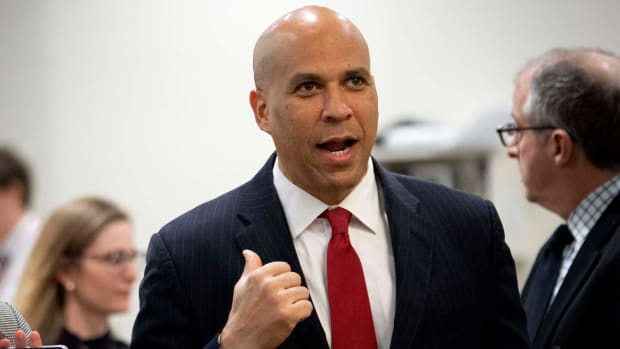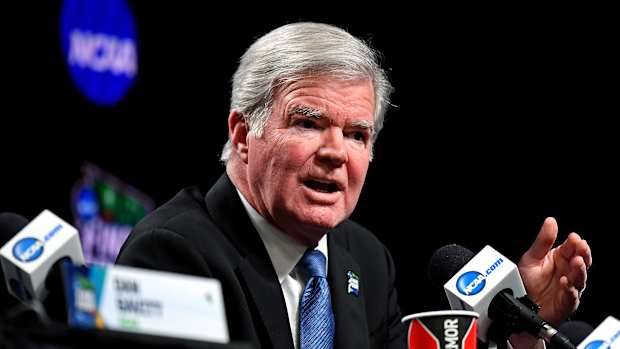A group of U.S. senators plans to introduce in Congress “a college athletes bill of rights” seeking to guarantee NCAA players monetary compensation, long-term healthcare, lifetime educational scholarships and more eligibility freedoms.
WASHINGTON, DC — Congressional members have voiced their desire recently for full-scale NCAA reform.
Now it is in writing.
A group of U.S. senators plans to introduce in Congress “a college athletes bill of rights” seeking to guarantee NCAA players monetary compensation, long-term healthcare, lifetime educational scholarships and more eligibility freedoms.
The sweeping proposal comes during a year in which college leaders are pleading for help from lawmakers to craft NCAA-friendly legislation on name, image and likeness (NIL), wanting a federal bill to preempt a bevy of differing NIL state laws. In response to the NCAA’s requests, some Congressional members have demands of their own. They want reform beyond NIL.
“For them to get the cooperation from us, they’re going to have to change some of their practices,” says Sen. Cory Booker (D-N.J.), a sponsor of the bill. “The NCAA feels urgency and needs to get federal cooperation. I’m going to make sure that we also are able to change NCAA practices that undermine the students’ education, well-being and basic first amendment rights.”

Ten senators—nine Democrats and one independent—jointly announced the bill’s framework on Thursday morning. Booker, a former college football player himself at Stanford, intends for the bill of rights to be rolled into federal NIL legislation already in the works in both chambers. He suggests that some Congressional support for NIL may hinge on the support for the bill of rights proposal, which as of now does not include Republican backing. “The way the Senate works…. the NCAA has come asking for significant authorities (with NIL). We are a body that works… they are not going to get something done if it’s not bipartisan.”
Some significant political players are joining Booker as sponsors, including former presidential candidates Bernie Sanders (I-Vt.), Kirstin Gillibrand (D-N.Y.) and Kamala Harris (D-Calif.), who was most recently chosen as Joe Biden’s running mate on the 2020 Democratic ticket.
The bill will be introduced in the “coming months” and is intended to advance “justice and opportunity” for college athletes, according to the joint statement. The legislation addresses several key areas, most notably athlete compensation.
• The proposal expands on the ways in which a college player can earn money, expanding well beyond NIL. Athletes would be allowed to enter group licensing deals, such as apparel clothing lines or the NCAA video game, and they could enter revenue-sharing agreements with athletic associations, conferences and their own schools. The NCAA and Power 5, strongly opposed to such freedoms, have restricted athletes from all of the above in its NIL proposed drafts—both of which SI has obtained.
• The legislation also calls for banning all restrictions and penalties attached to athletes’ school choice, from originally signing with a program to transferring among them. This could create what many college coaches and administrators would describe as “free agency.” Under current rules, players are bound to a school by signing a National Letter of Intent, and they must miss a year of eligibility when transferring to another program within FBS. However, that transfer rule is expected in January to be amended to allow players to transfer once without penalty.
• The bill of rights would also create an “oversight panel” to give athletes representation. The commission, led by current and former college athletes, policy experts, academics and administration officials, would “level the playing field by establishing baseline rules that govern college sports,” the statement says.
• The proposal also provides athletes with “lifetime scholarships” to return to campus post-eligibility to complete their education, enforces evidence-based health standards to keep players safe amid the COVID-19 pandemic and increases financial assistance for athletes suffering from long-term injury or virus-related health issues. Under current regulations, Power 5 programs are required to care for athletes’ medical woes at least two years after they leave the university.
• In a final requirement, the bill of rights seeks to hold schools more accountable of their internal finances, requiring each to provide detailed annual public reporting of their revenue and expenses. College athletic departments are notoriously secretive and often lack transparency. Each school does provide a detailed financial document to the NCAA annually that is available through public records requests. The legislation would also demand that schools report on athlete activities, specifically their hours spent on workouts, film study, travel, etc.
“This bill of rights is really about empowering athletes and giving them rights to protect themselves and make sure they share in the enormous revenues that are generated,” says Richard Blumenthal (D-Conn), one of the bill’s sponsors. “Coaches and athletic directors need to put their money where their mouth is. They talk about, ‘There’s no ‘i’ in team.’ All the slogans repeated before every game in a locker room need to be made real.”
Blumenthal expects the bill of rights to eventually garner bipartisan support, essential to it potentially merging with NIL legislation and passing through the legislative process. He’s spoken to Republicans who share these concerns, but they were not yet willing to join the effort. The timeline of the bill could stretch into the next Congress, when the Senate could look different after November elections. For now, Republicans control the body.
“The time is running pretty short in this session to get it done anyway,” Blumenthal says. “Our goal is really beyond this immediate session. We’re looking to the next session when we might have different membership in the Senate.”
Others joining the effort are Chris Murphy (D-Conn.), Ron Wyden (D-Ore.), Mazie Hirono (D-Hawaii), Brian Schatz (D-Hawaii) and Chris Van Hollen (D-Md.).
“Early last year, I set out to expose the inequities and civil rights issues in college sports and COVID-19 has only exacerbated them. We can’t return to business as usual—where a multi-billion dollar industry lines the pockets of predominately white executives all while majority-Black athletes can’t profit from their labor,” Murphy said in a statement. “The College Athletes Bill of Rights lays out the reforms college sports desperately need so we can finally put athletes economic rights, health and wellbeing, and educational opportunities first. This isn’t radical thinking—it’s just the right thing to do.”

Murphy, Booker and Blumenthal are central figures in the NIL debate, which has the potential to drastically change the NCAA landscape. The athletes bill of rights is another step in a near years-long NIL journey involving DC lawmakers and college athletic leaders. NCAA president Mark Emmert approached Congress about assisting in drafting a federal NIL bill in December.
Since then, the Senate has held three committee meetings on the subject—two with Emmert as a witness—and multiple NIL bills are being drafted in both the House and Senate. Sen. Marco Rubio (R-Fla.) announced his bill earlier this summer, but it’s not devoid of problems. Many fear it leans too heavily toward the NCAA and lacks bipartisan agreement.
Rep. Anthony Gonzalez (R-Ohio), a former Ohio State receiver, is finalizing his bill in the opposite chamber. Gonzalez’s bill is more player-friendly than Rubio’s but encompasses similar concepts, the Congressman told SI in a recent interview. He expects to introduce the bill when Congress convenes in mid-September.
Meanwhile, members of the Senate Commerce Committee could produce two separate bills of their own, and both are expected to be bipartisan in nature, which is essential to any legislation. Sen. Jerry Moran (R-Kans.), the chair of the Senate Commerce subcommittee specifically overseeing NIL, is drafting legislation with Blumenthal, both of them also working with Gonzalez and Emanuel Cleaver (D-Mo.).
There is a deadline of sorts. Florida’s state NIL law takes effect next July. Without a federal law, schools in Florida could quite literally play by different rules starting with the 2021 football season. Congress, already a slow-moving body, is grappling with a pandemic, potentially slowing any progress on this front.
As for the athletes bill of rights, the “time is ticking” on that too, says Booker. “It needs to get done.”